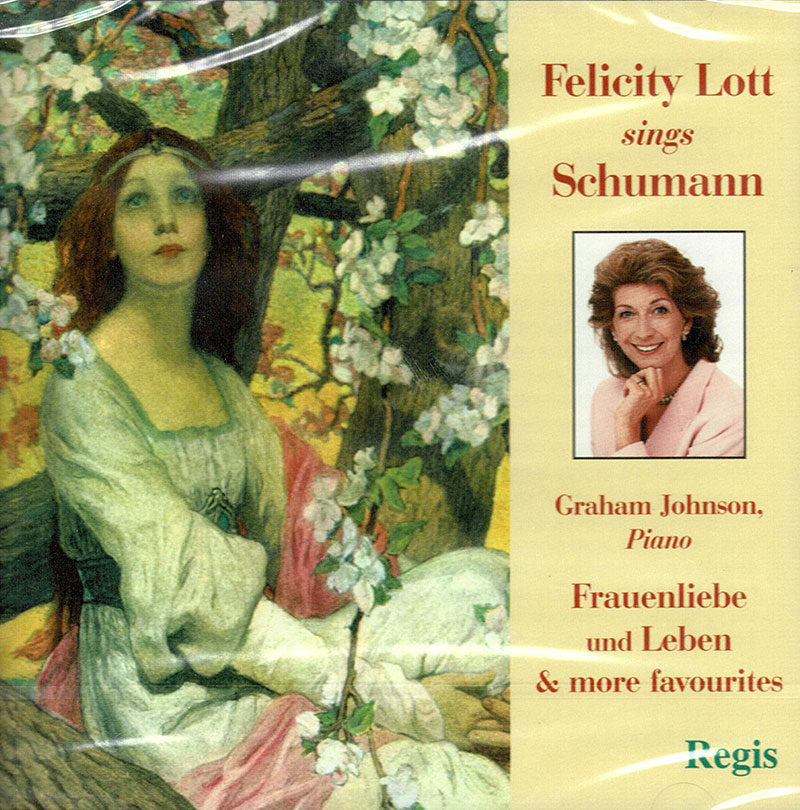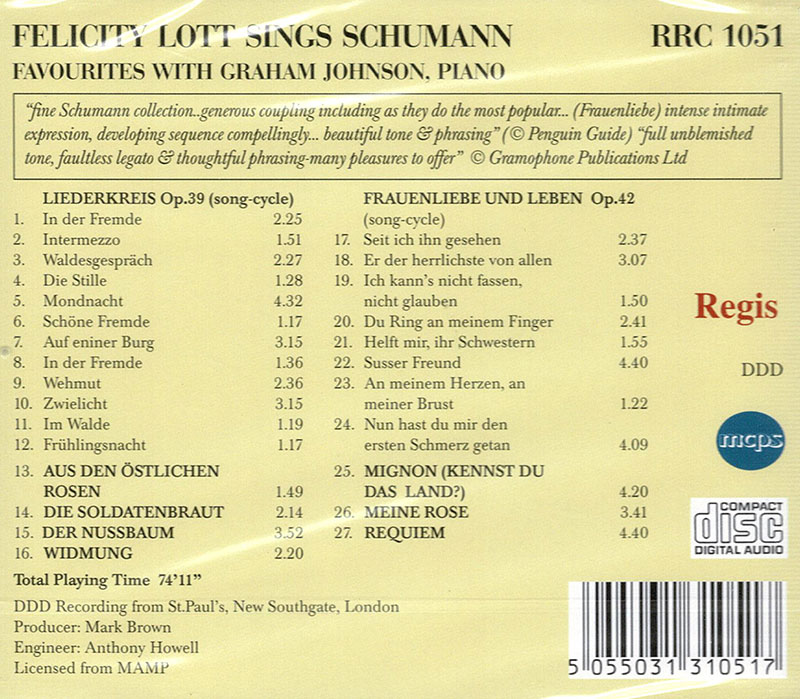Logowanie
Dziś nikt już tak genialnie nie jazzuje!
Bobby Hutcherson, Joe Sample
San Francisco
SHM-CD/SACD - NOWY FORMAT - DŻWIĘK TAK CZYSTY, JAK Z CZASU WIELKIEGO WYBUCHU!
Wayne Shorter, Freddie Hubbard, Herbie Hancock, Ron Carter, Elvin Jones
Speak no evil
UHQCD - dotknij Oryginału - MQA (Master Quality Authenticated)
Chesky! Niezmiennie perfekcyjny
Winylowy niezbędnik
ClearAudio
Double Matrix Professional - Sonic
najbardziej inteligentna i skuteczna pralka do płyt winylowych wszelkiego typu - całkowicie automatyczna
SCHUMANN, Felicity Lott, Graham Johnson
Felicity Lott sings favourite songs

- Liederkreis Op.39 (song-cycle)
- 1. In der Fremde 2.25
- 2. Intermezzo 1.51
- 3. Waldesgesprach 2.27
- 4. Die Stille 1.28
- 5. Mondnacht 4.32
- 6. Schone Fremde 1.17
- 7. Auf miner Burg 3.15
- 8. In der Fremde 1.36
- 9. Wehmut 2.36
- 10. Zwielicht 3.15
- 11. Im Walde 1.19
- 12. Fruhlingsnacht 1.17
- 13. AUS DEN OSTLICHEN ROSEN 1.49
- 14. DIE SOLDATENBRAUT 2.14
- 15. DER NUSSBAUM 3.52
- 16. WIDMUNG 2.20
- FRAUENLIEBE UND LEBEN Op.42
- (song-cycle)
- 17. Seit ich ihn gesehen 2.37
- 18. Er der herrlichste von allen 3.07
- 19. Ich kann's nicht fassen, nicht glauben 1.50
- 20. Du Ring an meinem Finger 2.41
- 21. Helft mir, ihr Schwestern 1.55
- 22. Susser Freund 4.40
- 23. An meinem Herzen, an meiner Brust 1.22
- 24. Nun hast du mir den ersten Schmerz getan 4.09
- 25. MIGNON (KENNST DU DAS LAND?) 4.20
- 26. MEINE ROSE 3.41
- 27. REQUIEM 4.40
- Felicity Lott - soprano
- Graham Johnson - piano
- SCHUMANN
"fine & generous Schumann collection inc all favourites... superb phrasing... faultless legato... many pleasures" (Penguin Guide & Gramophone) illustrative of the sun's hot rays which cause the rose to wilt. The soprano, singing sadly to the rose, would gladly pour out her soul to this flower, but expresses doubt as to whether the flower is capable of reviving. From the same opus number comes Requiem, a prayer for the soul of one who `long did yearn for blissful union'. The singer describes the starlit scene of the tomb and hopes that one day her dead lover will appear as one of the stars in the heavens. Die Soldatenbraut (the soldier's bride) is a lighthearted setting of Morike's skittish and playful poem in which a young woman longs to marry her lover so she can boss him about at home. The pianist not only imitates a somewhat bombastic military band, but also gives us clues to the woman's saucy character. On the morning of his wedding to Clara, Schumann presented her with a bound volume of a collection of twenty six of his songs under the title of Myrthen (it had been a tradition for German brides to wear myrtle-blossom head bands). Among the poems set were some by Goethe, Ruckert, Burns and Heine. Three of these songs appear in this collection: Aus den ostlichen Rosen, Der Nussbaum, and Widmung and they can all be seen as love songs to Clara. Aus den ostlichen Rosen is by Ruckert and has two contrasting verses: the first carefree, the second careworn, although the hope expressed in the second verse is that, although the writer may be troubled, the recipient may not be affected. The swaying tempo of Der Nussbaum by Mosen (the walnut tree) clearly represents that of the tree outside the future bride's house. The breezes rustling in the branches are hinting delicately of a happy occasion sometime in the future, and as they whisper, the girl inside smiles in her sleep. Ruckert's Widmung (Dedication) is an ecstatic declaration of love in which Schumann's singer seems passionately borne ever upward. A more down-to-earth middle section `You are rest, you are peace, bestowed on me by Heaven' passes on to a tender passage `You raise me up lovingly - you, my good spirit, my better self. All of a sudden the carefree opening mood returns leading the song (and this recital) to a spirited close. This Schumann recital brings together two of Britain's finest exponents of Lieder: Dame Felicity Lott and Graham Johnson. Lott, born in Cheltenham in 1947, is perhaps best known as a Strauss and Mozart singer, but has also given many memorable performances in British and French opera. As a member of the Songmaker's Almanac (founded by Graham Johnson in 1976) she is a sought after interpreter of a wide range of songs. Hugely popular wherever she sings, she has performed with great distinction the world over and has made a number of outstanding recordings. Her recording of Schubert's Der Hirt auf dem Fels is available on Regis RRC 1027 as is a Schubert recital with Graham Johnson. Not only has Graham Johnson (born in 1950) performed regularly with other members of the Songmaker's Almanac but he has also accompanied singers from previous generations such as Janet Baker, Elisabeth Schwarzkopf and Victoria de los Angeles. He is an exceptionally busy recording artist having recorded all of Schubert's Lieder for Hyperion and much else besides. His concerts are noted for their thoughtfully programmed content, often around a literary figure or historical period with complementary readings, in order that his audiences may appreciate the songs all the more. © 2001 James Murray


































